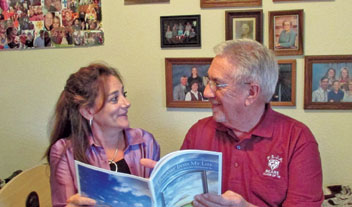What follows are a few of the success stories from centers that implemented the A Passport Into My Life program. Resident names have been changed to ensure compliance with privacy and other regulations.

■
Jenny Johnston, LBSW, at Oak Crest Nursing Center: Dorothy was very anxious throughout the day. After the family completed the Passport, staff learned that Dorothy had been a hard-working farm woman. She also loved black coffee and was extremely close to a few relatives. Using this information, staff began serving Dorothy coffee and engaging her in conversation about life on the farm, being sure to include the names of those relatives she held dear. Dorothy is no longer anxious and is on a gradual dose-reduction program for her antipsychotic.
■
Theresa Rohrer, activities director at Wathena Healthcare and Rehabilitation Center: Beatrice was at high risk for falls and became agitated every afternoon. After family completed the Passport, staff learned that Beatrice spent her entire life helping others. Every afternoon Beatrice now sits behind the nurses’ station. The center has supplied her with her own notebooks, pens, and stacks of papers. Beatrice is very calm as she “works” through her papers, “helping” the nurses. The order for the antipsychotic medication has been discharged.
■
Kathleen Rose, director of staff development at Valley Healthcare Center: Lillian would continually yell out and become very agitated in the afternoon during change of shift. After her family completed the Passport, staff learned that Lillian had been a high school teacher with a reputation for zero noise tolerance/disruption from her students. Lillian now enjoys sitting in the lobby during change of shift (instead of by the nurses’ station), and staff use their “inside” voices when talking to Lillian. Staff also now play word spelling games when they interact with Lillian. Her antipsychotic medication has been discharged.
■
Terri Greaves, director at Vintage Park at Neodesha: After caring for his wife with dementia for five years at home, the time had come when Abe needed to admit her into a center. Even when it is for the best, it is very hard on the family. Abe completed the Passport in great detail, writing down every nuance that he had come to learn over his time as his wife’s caregiver. When Abe gave the Passport to Terri, he had tears in his eyes as he thanked the center for caring enough to want to know everything about his wife so they could provide her with the best possible care.